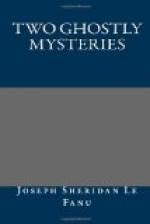secured on the interior, was closed; a circumstance
not a little puzzling, as it afforded the only other
mode of escape from the room. It looked out, too,
upon a kind of court-yard, round which the old buildings
stood, formerly accessible by a narrow doorway and
passage lying in the oldest side of the quadrangle,
but which had since been built up, so as to preclude
all ingress or egress; the room was also upon the
second story, and the height of the window considerable;
in addition to all which the stone window-sill was
much too narrow to allow of any one’s standing
upon it when the window was closed. Near the
bed were found a pair of razors belonging to the murdered
man, one of them upon the ground, and both of them
open. The weapon which inflicted the mortal wound
was not to be found in the room, nor were any footsteps
or other traces of the murderer discoverable.
At the suggestion of Sir Arthur himself, the coroner
was instantly summoned to attend, and an inquest was
held. Nothing, however, in any degree conclusive
was elicited. The walls, ceiling, and floor of
the room were carefully examined, in order to ascertain
whether they contained a trap-door or other concealed
mode of entrance, but no such thing appeared.
Such was the minuteness of investigation employed,
that, although the grate had contained a large fire
during the night, they proceeded to examine even the
very chimney, in order to discover whether escape
by it were possible. But this attempt, too, was
fruitless, for the chimney, built in the old fashion,
rose in a perfectly perpendicular line from the hearth,
to a height of nearly fourteen feet above the roof,
affording in its interior scarcely the possibility
of ascent, the flue being smoothly plastered, and
sloping towards the top like an inverted funnel; promising,
too, even if the summit were attained, owing to its
great height, but a precarious descent upon the sharp
and steep-ridged roof; the ashes, too, which lay in
the grate, and the soot, as far as it could be seen,
were undisturbed, a circumstance almost conclusive
upon the point.
Sir Arthur was of course examined. His evidence
was given with clearness and unreserve, which seemed
calculated to silence all suspicion. He stated
that, up to the day and night immediately preceding
the catastrophe, he had lost to a heavy amount, but
that, at their last sitting, he had not only won back
his original loss, but upwards of L4,000 in addition;
in evidence of which he produced an acknowledgment
of debt to that amount in the handwriting of the deceased,
bearing date the night of the catastrophe. He
had mentioned the circumstance to Lady Tyrrell, and
in presence of some of his domestics; which statement
was supported by their respective evidence.
One of the jury shrewdly observed, that the circumstance
of Mr. Tisdall’s having sustained so heavy a
loss might have suggested to some ill-minded persons,
accidentally hearing it, the plan of robbing him,
after having murdered him in such a manner as might




